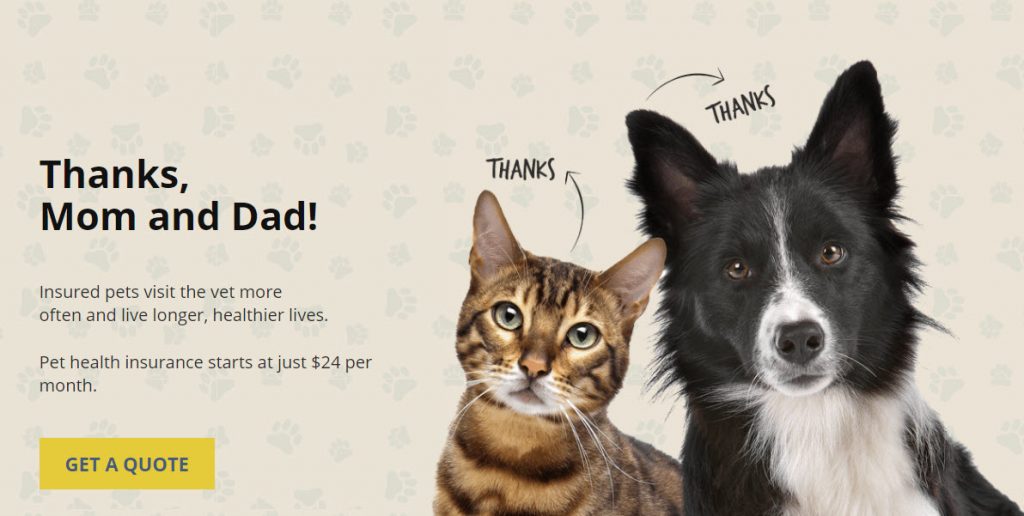Dog Diarrhea: What Can You Do To Help?

Free Pet Insurance Comparison
Compare Quotes From Top Companies and Save
Secured with SHA-256 Encryption
Dr. Pippa Elliott BVMS, MRCVS
Veterinarian
Dr Pippa Elliott BVMS, MRCVS is a veterinarian with over 30 years of experience in companion animal practice. In 1987 she graduated from the University of Glasgow, with a degree in veterinary medicine and surgery. She works at Blythwood Vets and the People’s Dispensary for Sick Animals (PDSA). Pippa is an advocate of Fear-Free Practice, an animal addict, and a veterinary writer. She is also w...
Veterinarian
UPDATED: Feb 3, 2025
Pet Insurance U receives compensation from the third parties included on this site. This includes payment for clicks from our site to insurance providers’ sites and quote requests generated. Our rankings and reviews are not affected by payments from the insurance companies. The compensation we receive allows the site to be free and regularly updated. Our goal is to review every pet insurance provider, but not all companies are listed on the site.
And many of the companies we review do not pay us anything. We simply rate, compare and review their plan because we feel it will be valuable to you. Our reviews are guaranteed to be unbiased, professional and advertising compensation does not influence rankings.
We are a free online resource for anyone interested in learning more about pet insurance. Our goal is to be an objective, third-party resource for everything pet insurance related. We update our site regularly, and all content is reviewed by pet insurance experts.
UPDATED: Feb 3, 2025
Pet Insurance U receives compensation from the third parties included on this site. This includes payment for clicks from our site to insurance providers’ sites and quote requests generated. Our rankings and reviews are not affected by payments from the insurance companies. The compensation we receive allows the site to be free and regularly updated. Our goal is to review every pet insurance provider, but not all companies are listed on the site.
And many of the companies we review do not pay us anything. We simply rate, compare and review their plan because we feel it will be valuable to you. Our reviews are guaranteed to be unbiased, professional and advertising compensation does not influence rankings.
On This Page
Diarrhea is never pleasant for anyone. And diarrhea in a dog is flat-out horrible.
When your canine companion has “to go” every five minutes or frequent and watery bowel movements start collecting on your floor and couch, no one is happy.
Diarrhea can also be accompanied by pain, cramping, and irritation. If your dog has an occasional bout of diarrhea, it’s unlikely to be cause for concern.
But if it continues or worsens, please take your dog to your veterinarian.
Diarrhea not only leads to dehydration, a condition that can quickly become serious on its own, but diarrhea may also be an indication of a more serious condition or illness.
The most likely cause of diarrhea in your dog is going to depend greatly on the dog’s age, breed, eating habits, and recent history.
Need Pet Insurance?
FACT: Pet insurance pays up to 90% of vet bills when your pet is sick or injured!
- If the dog just consumed a turkey dinner from the owner’s plate and diarrhea comes and leaves suddenly dietary indiscretion, or eating too much of things they shouldn’t, is a very common and likely cause.
- If the dog is a young puppy and he and his siblings are all having smelly diarrhea with blood and vomiting, they should be evaluated immediately for parvovirus, a disease that is serious, contagious, and deadly.
Table of Contents:
Dog Diarrhea Causes

Acute Diarrhea
Acute diarrhea, or diarrhea that starts suddenly, is most often due to dietary indiscretion or dietary change. Dogs commonly present with diarrhea after overeating or ingesting trash, roadkill or other spoiled foods.
Eating plants, sticks, rocks, bones, fabric or other animal’s feces are also frequent complaints. Dogs may also experience intolerance or allergies to certain foods, including additives, milk products, corn, wheat gluten, etc.
Acute diarrhea typically lasts a short while and often resolves on its own or with supportive care. Acute diarrhea caused by parasites, infectious diseases or other factors may require additional diagnostics and treatments.
Related: 10 Things You Must Know Before You Buy Pet Insurance
If the dog has no history of diet change or eating something he shouldn’t, a trip to the vet should be in order if diarrhea:
- Worsens
- Lasts more than 24-48 hours
- Contains blood
Chronic Diarrhea
Chronic diarrhea is diarrhea that lasts longer than two to three weeks. Diarrhea can be constant or occur persistently and episodically.
Parasites, dietary intolerance or allergies, infectious diseases, and neoplasia (cancer) can all cause chronic diarrhea.
The easiest way to help your veterinarian determine what is causing your pet’s diarrhea and provide appropriate diagnostics and treatment is to provide a description of your animal’s bathroom behavior.
This description can help localize the problem or find the abnormal area or areas of the body that are causing diarrhea.
Diarrhea can be due to an abnormality in a dog’s small intestines, large intestines or organs outside of the digestive/intestinal tracts.
- Small intestines are the tube-like structures the food enters after it leaves the stomach. They’re responsible for most of the body’s digestion and absorption of nutrients.
- Large intestines, critical for water re-absorption and hydration, immediately follow the small intestines. They escort the food the remainder of the way to the anus, where any remains leave the body.
Real Cost Savings from PetFirst Clients

Luna
PetFirst saved his parents
$6,712
A happy energetic Luna one morning couldn’t hold her food down. After months of multiple costly vet visits to specialists and an endoscopy, the problem was discovered and fixed. Luna put 22 pounds back on in no time and her parents were grateful for having PetFirst by their side to pay the bills.
Small Intestinal Diarrhea
Dogs suffering small intestinal diarrhea often pass larger amounts of stool and may have an increase in the number of bowel movements per day.
These animals also commonly vomit and lose weight. Excess gas is another common complaint, and some owners will report hearing rumblings in their dog’s belly.
If there is bleeding into the small intestines, that blood will be digested and may turn the stool dark black.
Food intolerance, pancreatic insufficiency (more prevalent in large breed dogs, especially German shepherds), and inflammatory bowel disease commonly present as small intestinal diarrhea.
Large Intestinal Diarrhea
Large intestinal diarrhea will typically result in dogs having to go to the bathroom with great frequency, more than five times per day.
Small amounts of stool are produced with each bowel movement, and straining is frequently observed as the dog attempts to pass the feces.
Mucus is frequently seen on stool caused by large intestinal diarrhea. Any bleeding into the large intestine will appear bright red in the feces.
Parasites such as whipworms or giardia, and stress colitis typically present as large intestinal diarrhea.
The most common causes of diarrhea vary, depending on whether the diarrhea is originating from a problem with the small or large intestines.
Different diagnostics and different treatments will be offered, depending on the clinical signs described. Make sure to let you veterinarian known the answers to the following questions:
- How frequently is your pet is going to the bathroom? (<5 or >5 times a day)
- How much stool is being passed with each bowel movement? (smaller or larger than normal)
- What color is the feces? (dark black, obvious red blood, slimy with mucus)
- Have you noticed any weight loss?
- Is your pet also vomiting or showing other signs of illness?
- How long has your pet had diarrhea?
Many diseases can present with either small or large intestinal diarrhea or both. Others can present as acute diarrhea, chronic diarrhea, or acute diarrhea that becomes chronic.
Simple cases of diarrhea may resolve without treatment, but many others may become serious and even life-threatening for your pet. Head to the veterinarian immediately if your dog:
- May have eaten something toxic or poisonous
- Ingested a foreign body (stones, toys)
- Is a young puppy (vaccinated or not)
- Has digested blood (dark black) or obvious blood in his feces
- Has continuous or worsening diarrhea after 24-48 hours
Vomiting, lethargy, straining to defecate, decreased appetite, and weight loss is also signs of a more serious condition that may initially present as diarrhea.
Enter your ZIP code below to view companies that have cheap pet insurance rates.
Secured with SHA-256 Encryption
Diarrhea in Dogs
Cost of Treatment: $50 to $105 per month
What it is: Stool that is abnormally watery or soft counts as dog diarrhea, one of the most common digestive health issues suffered by canines.
Causes are numerous, ranging from an ingested foreign object to an allergic reaction or underlying health condition.
Symptoms:
- Blood in the stool
- Excessive straining
- Dehydration
- Vomiting
- Weakness, pain
- Agitation
Treatment for Dog Diarrhea
Dogs suffering from mild diarrhea often benefit from drinking plenty of water but going without food for 12 to 24 hours.
Mild cases often clear up on their own after a day or so, although diarrhea that lasts more than one day or is accompanied by other symptoms generally requires a trip to the vet for an exam and treatment.
Treatment varies widely, depending on the cause behind the condition. Many dog insurance policies cover vet exams and visits for diarrhea, along with the cost of related treatment. If you’re looking for more info about dog insurance plans, we have you covered.
Return to the Dog Health Problems glossary.
Other articles you may find helpful:
Is Exotic Pet Insurance Necessary?
The Best Pet Insurance By State
Fun Facts, Dog FAQ, And Unsolicited Dog Advice
5 Training Commands to Save Your Dog’s Life
The Ultimate Guide to Safe Foods for Dogs
We get it, your dog is like your child and when your puppy or dog has health problems it is scary. Luckily there is pet insurance companies that will help you pay for any veterinarian care they made need. Checkout the best puppy and dog pet insurance companies and learn about common puppy health issues and ailments in older pets.
Common Health Problems:
Chronic Active Hepatitis in Dogs
Cruciate Ligament Tear in Dogs
Degenerative Myelopathy | Spinal Cord Disease In Dogs
Dementia in Dogs | Canine Cognitive Dysfunction
Dog Comedones (Schnauzer Bumps)
Dog Diarrhea: What Can You Do To Help?
Gallbladder Obstruction in Dogs
Heart Murmurs In Dogs | How To Identify Them
Intervertebral Disc Disease In Dogs
Nasal Solar Dermatitis In Dogs
Progressive Retinal Atrophy In Dogs
The Dog Flu – Symptoms & Treatment for Canine Influenza

Frequently Asked Questions
What is SHA-256 Encryption, and how does it relate to insurance?
SHA-256 Encryption is a secure cryptographic hash function used to protect sensitive information online. In the context of insurance, it ensures that your data, such as personal details and financial information, is securely transmitted and stored.
Who is Melanie Musson, and why is her insurance expertise relevant?
Melanie Musson is a published insurance expert with a deep understanding of state-specific car insurance laws and dynamics. Her expertise covers various aspects of insurance, making her insights valuable for individuals looking to navigate the complexities of insurance coverage.
Why does the FAQ page include information about Dog Diarrhea and Pet Insurance?
The inclusion of information about Dog Diarrhea and Pet Insurance reflects a diverse range of topics covered by the website. While primarily focused on insurance, the site also provides valuable information on pet health, showcasing a comprehensive approach to user education.
Can I trust the information provided on this site regarding pet insurance?
Yes, the site assures unbiased, professional reviews. The content is regularly updated and reviewed by pet insurance experts. The goal is to serve as an objective, third-party resource for individuals seeking information about pet insurance.
What is the significance of the “Secured with SHA-256 Encryption” notice?
This notice emphasizes the use of SHA-256 Encryption to secure the website, reassuring users that their data is protected. It’s a standard practice to display such notices on websites dealing with sensitive information to build trust with users.
How does the site generate revenue, and does it impact the reviews and rankings?
The site receives compensation from third parties, including insurance providers, through clicks and quote requests. However, the rankings and reviews remain unbiased, and compensation does not influence them. The revenue generated helps maintain the site as a free and regularly updated resource.
What should I do if my dog has diarrhea?
If your dog experiences occasional diarrhea, it may not be a cause for concern. However, if it persists or worsens, it’s recommended to take your dog to the veterinarian. Diarrhea can lead to dehydration and may indicate an underlying health issue that requires attention.
How does pet insurance contribute to managing the cost of treating dog diarrhea?
Pet insurance can cover up to 90% of vet bills for treating illnesses like dog diarrhea. The cost of treatment, which may include vet exams and related expenses, can be partially or fully covered by pet insurance, depending on the policy.
Are chronic diarrhea and IBS-D the same in dogs? Can IBS-D be cured?
Chronic diarrhea in dogs may be related to various causes, including inflammatory bowel disease (IBD). While chronic diarrhea and IBS-D share similarities, IBS-D may not have a definitive cure. Consulting with a veterinarian is crucial for accurate diagnosis and appropriate treatment options for your dog’s specific condition.
How can I find the cheapest pet insurance rates?
The website serves as a resource for finding information about pet insurance, including guides on getting started and tips for finding the most affordable rates. Users can enter their ZIP code to view companies offering competitive pet insurance rates.
Enter your ZIP code below to view companies that have cheap pet insurance rates.
Secured with SHA-256 Encryption
Dr. Pippa Elliott BVMS, MRCVS
Veterinarian
Dr Pippa Elliott BVMS, MRCVS is a veterinarian with over 30 years of experience in companion animal practice. In 1987 she graduated from the University of Glasgow, with a degree in veterinary medicine and surgery. She works at Blythwood Vets and the People’s Dispensary for Sick Animals (PDSA). Pippa is an advocate of Fear-Free Practice, an animal addict, and a veterinary writer. She is also w...
Veterinarian
We are a free online resource for anyone interested in learning more about pet insurance. Our goal is to be an objective, third-party resource for everything pet insurance related. We update our site regularly, and all content is reviewed by pet insurance experts.
